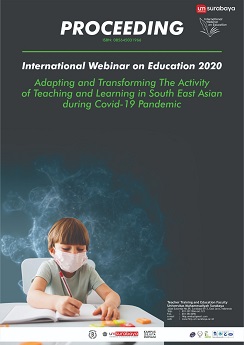Peer and self assessment in e-learning using moodle and whatsapp as scaffolding to improve students 'ability tobe self-learners
Abstrak
Abstract.
Online learning (e-learning) as a solution for learning activities during the Covid
19 pandemic in Indonesia. This study aims to describe student learning outcomes in developing Classroom Action Research proposals through the Peer and Self Assessments method in e-learning using Moodle and Whatsapp. The study design was a preexperimental design using One Shot Case Study. The research subjects were students of Biology Education Study Program at the University of Muhammadiyah Surabaya who took the Classroom Action Research course in the even semester of the academic year 2019/2020 with a purposive sampling technique. Data collection techniques through product performance assessment and student response. Data were analyzed descriptively. The results showed that the use of Peers and Self Assessment can encourage students to be actively involved in building knowledge, attitudes, and behavior to become independent learners.
Referensi
Fendy, P. Y., 2017. Pengembangan E-Learning Berbasis Moodle untuk Peserta Kursus di Swift English School Yogyakarta. E-Jurnal Prodi Teknologi Pendidikan, Volume VI, pp. 813-827.
Yanuar, A. F., 2017. Rancang bangun Aplikasi E-Learning pada Enterprise Resource Planning Retail dengan Optimasi Pencarian Menggunakan Metadata.
Widhiyasari, Mega, Nailariza Umami, Imam Sukwatus Suja‘i, 2019. Pengaruh Penggunaan Media Sosial WhatsApp Terhadap Keaktifan Siswa Pada Mata Pelajaran Ekonomi Bisnis Kelas X SMKN 2 Boyolangu Tahun ajaran 2018/2019, Jurnal Pendidikan Ekonomi, Vol.12, No.2, 2019,http://journal2.um.ac.id/index.php/jpe/index.
Yun-JoAn and Li Cao. 2014. Examining the Effects of Metacognitive Scaffolding on Students' Design Problem Solving and Metacognitive Skills in an Online Environment. Journal of Online Learning and Teaching Vol. 10 No. 4 Desember 2014.
Orey, M. (2010). Emerging Perspectives on Learning, Teaching, and Technology. The Global
Text Project is Funded by The Jacobs Foundation, Zurich, Switzerland.
Boud, D., Cohen, R. and Sampson, J.,(1999). ‗Peer learning and assessment‘, Assessment
&Evaluation in Higher Education 24.4: 413–426.
Suarta, Nyoman. Sentosa Hardika, 3)I Gusti Ngurah Sanjaya, & 4)I Wayan Basi Arjana, (2015). Model Authentic Self-Assessment Dalam Pengembangan Employability Skills
Mahasiswa Pendidikan Tinggi Vokasi. Jurnal Penelitian dan Evaluasi Pendidikan Volume 19, No 1, Juni 2015 (46-57) Tersedia Online: http://journal.uny.ac.id/index.php/jpep
Siswaningsih, Wiwi, Gebi Dwiyanti, dan Cahya Gumilar (2013). Penerapan Peer Assessmen
dan self Assessment Pada Tes Formatif Hidrokarbon Untuk Feedback Siswa SMA Kelas X.Jurnal Pengajaran MIPA, Volume 18, Nomor 1, April 2013, hlm. 107-115.
Karsidi, K., Mulyani, S., & Indriyanti, D. R.(2013). Penerapan perangkat pembelajaran sistem regulasi model kooperatif tipe jigsaw berbasis peer assessment. Journal of Innovative Science education, 2 (1), 21-26. Retrive from: http://journal.unnes.ac.id/sju/index.php/j ise.
Arends & Kilcher, (2010), Teaching For Student Learning, New York: Routledge
Sugiyono. (2015). Metode Penelitian Pendidikan, Pendekatan Kuantitatif, Kualitatif dan R&D. Bandung: Alfabeta.
Mooney, Shannon Tighe, Meliosa Braken, Barbara Dignam, 2016. Peer Assessment as a Teaching and Learning Proces: The Observation and Reflection of Three Facilitator on FirstYear Under Garduate Critical Skills Module, AISHE-J Volume 8 Number 2.
Ohira, Norman, (2013). Pengembangan Rubrik Proposal Penelitian Pada Mahasiswa Program Studi Tadris Biologi Jurusan Tarbiyah STAIN Kerinci. Tesis. Konsentrasi Penelitian dan Evaluasi Pendidikan Program Studi Teknologi Pendidikan Program Pascasarjana Universitas Negeri Padang. Diakses pada 20 Januari 2019.
Slavin, E. R. (2011). Educational psychology. theory and practice. Boston: Pearson.
Donham Donham, J. (2010). Creating personal learning through self-assessment. TeacherLibrarian, 37 (3), 14-21
Orlich, D. C., Harder, R. J., Trevisan, M. S.,Brown, A. H., & Miller, D. E. (2007). Teaching strategies a guide to effective instruction (8th ed.). New York:Houghton Mifflin Company
Trilling , B., and Fadel, C., (2009). 21st Century skills: Learning For Life in Our Times. San Francisco, CA: John Willey & Sons






